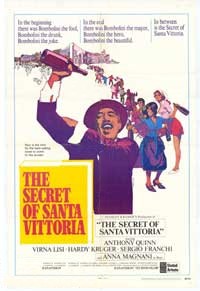Plot
The story is set during World War II in the summer of 1943, immediately after the fall of Italy's Fascist government under Benito Mussolini, when the German army moved to occupy most of the country. The only substantial source of income for the little hill town of Santa Vittoria is its wine. The townsfolk learn that the German occupation forces will be arriving soon, with plans to confiscate most of Santa Vittoria's wine and transport it to Germany. The people organize under the inspiration of their new mayor, Italo Bombolini (Anthony Quinn), who until days before had been thought of as a buffoon by everyone in town including his wife (Anna Magnani), and had only been appointed mayor by the town’s pro-Mussolini politicians as a ruse to deflect the people’s anger. With everyone working together, the villagers are able to hide a million bottles of wine by sealing them up in the galleries of an ancient Roman cave before the arrival of a German army detachment under the command of Sepp von Prum (Hardy Krüger).
The Germans, when they arrive, confiscate most of the almost 320,000 bottles of wine the villagers had left for them to find. However, the Germans have accounting records that there is supposed to be five times as many bottles. Von Prum comes to suspect the rest is hidden in or near Santa Vittoria. He and Bombolini, two very different men, engage in a battle of wits in the days that follow. The Germans’ search is made complicated when von Prum becomes infatuated with Caterina Malatesta (Virna Lisi), an educated and elegant woman unlike any other in town. She is secretly sheltering and has fallen in love with Tufa (Sergio Franchi), a wounded captain in the Royal Italian Army, who, as it happens, has provided much of the brainpower for the town’s so far successful wine-hiding plans.
Von Prum orders every building and home and the surrounding area searched. His men find no wine, but they discover Tufa hiding in Caterina’s home. Later von Prum, who by now is absolutely certain the village is indeed hiding one million bottles of wine from him, orders several villagers to be tortured into revealing its location. However, the villagers cunningly arrange for the Germans to select the pro-Mussolini politicians to be tortured, who because they had been arrested shortly after Bombolini had become mayor, genuinely do not know anything about any hidden wine.
Finally, with time running out before the Germans must withdraw north toward the Gustav Line, a frustrated von Prum threatens to shoot mayor Bombolini in front of the assembled townspeople unless the hidden wine's location is told. No one speaks up. Not being a Nazi fanatic, and perhaps also because he had been somewhat appeased by Caterina’s having spent the previous night with him, which she did to save Tufa from being executed for desertion, von Prum silently accepts defeat and leaves the town without harming the mayor. After the Germans leave Santa Vittoria, the townspeople, led by Bombolini, celebrate their victory by dancing in the streets.
Awards and nominations
The film was nominated for two Academy Awards for Best Film Editing (William A. Lyon and Earle Herdan) and Best Music Score (Ernest Gold). It was nominated for an Eddie award by the American Cinema Editors for best edited feature film.
The film won the Golden Globe Award for Best Motion Picture Comedy and was nominated by the Golden Globe Awards committee for Best Director (Stanley Kramer), Best Actor Comedy (Anthony Quinn), Best Actress Comedy (Anna Magnani), Best Original Score (Ernest Gold) and Best Original Song ("Stay", Ernest Gold and Norman Gimbel)
This page is based on this
Wikipedia article Text is available under the
CC BY-SA 4.0 license; additional terms may apply.
Images, videos and audio are available under their respective licenses.
